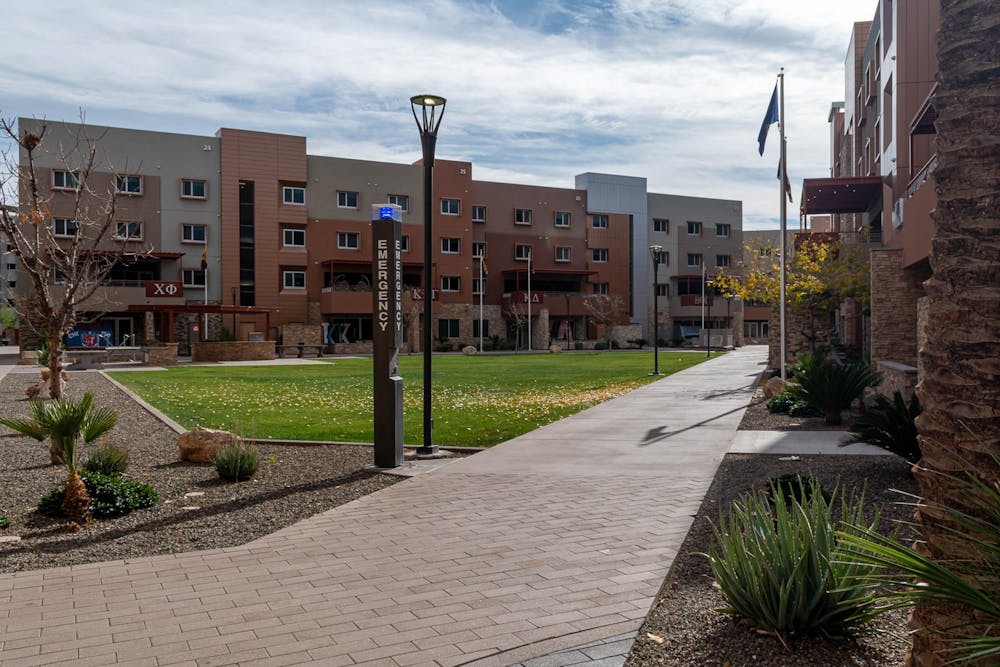Several of ASU’s Greek organizations have been hot topics in the news lately, sometimes for the wrong reasons. Between hazing and breaking COVID-19 guidelines, the Greek Leadership Village has been a hotbed of controversy.
Several fraternities at ASU have placed the health of their members and the ASU community in danger. At this point, something has to be done. These organizations need to be held accountable for their actions, and regulations need to be implemented so that these behaviors do not reoccur.
With Arizona being a global coronavirus hotspot, parties thrown by any organization can contribute to the spread and even become super-spreader events. Students who attend these parties do not seem too worried about spreading COVID-19 to vulnerable populations, and at least four Greek organizations have been put on interim suspension for possible COVID-19 violations, according to azfamily.
That alone should be a punishable offense, but these gatherings have been the least of the community’s worries. Suspected fraternity parties, which the University has said is investigating, have taken place around campus since Fall 2020.
These “investigations,” which nothing seems to come of, but this seems to be more than an issue with just one fraternity or sorority. This is an issue with the entire Greek Life system at ASU.
The idea that young people are not as severely affected by the pandemic is not true. One ASU student had a heart attack due to COVID-19 complications. While most youth cases are mild, we cannot ignore the effects that COVID-19 has on those who are elderly or who have health conditions. If people could think about their community, instead of thinking about their own selfish desires, this health crisis could have been over by now.
This type of irresponsible behavior is nothing new to some Greek organizations. Even without COVID-19 in the equation, these fraternities still find other ways to pose as a local biohazard.
One ASU fraternity, Kappa Sigma, is in legal trouble due to some hazing incidents that went too far, which is not the first hazing-related lawsuit a fraternity at ASU has faced. According to a complaint filed in the Maricopa County superior court, Kappa Sigma pledges were forced to perform rituals in multiple off-campus houses, one they called “Auschwitz,” which is anti-Semitic, to say the least.
One of the pledges was forced to put hot sauce in his pants, sleep outside on a bed of rocks for only a few hours a night and put on a diet of skittles and tequila, the complaint said. This caused one of the students to have a health episode, where he developed diabetes, according to the lawsuit.
These incidents are mild when you look further into some of Greek Life’s past controversies. Greek Life also has a bad reputation when it comes to sexual misconduct, according to articles compiled by Sun Devils Against Sexual Assault.
Joseph Forte, an ASU alumnus, director the film "Alpha Class," and co-founder of D-MAK Productions, said since social media is so prevalent, some of the controversial actions taken by members of Greek Life are easier to spot now.
Forte's film highlights what ASU's Greek Life was like a decade ago and offers suggestions for reparations.
He stated that the issues within Greek Life are internal and need to be resolved from the inside. He suggested that a hazing ban is not the solution because students may not comply, which could potentially lead to the performance of even worse hazing rituals. Rather, Forte suggested that regulations should be implemented and enforced for the types of hazing that are permitted by the University.
"Everything that you make illegal, people gravitate to," Forte added.
What can we do as a University to make sure these types of incidents are properly handled and not repeated?
First, ASU leaders need to take a strong stance against this type of behavior. They should not be afraid to call out the names of organizations who participate in hazing, breaking COVID-19 guidelines and other dangerous behaviors. It would be prudent for them to make a statement on these incidents when they happen.
Forte proposed alternative initiation and hazing rituals — such as cleaning, exercise or study hours — that could help students learn valuable life skills as opposed to dangerous activities. Additionally, he said he believes that bringing in former Greek Life alumni every year could help in boosting morale and managing Greek issues.
Though Greek Life is flooded with issues, Forte said it still has helped some people make lifelong connections. "In such a big campus like ASU, Greek Life helps shrink things down into smaller communities" he said.
In an ideal world, these friendships could still be made, while also filtering out some of the more negative effects Greek Life has had on the lives of many others.
No matter what type of solution Greek Life comes up with, they need to think of one sooner rather than later. Otherwise, it's only a matter of time before another student's safety is put in jeopardy.
Reach the columnist at htenore@asu.edu or follow @haleyyhmt on Twitter.
Editor’s note: The opinions presented in this column are the author’s and do not imply any endorsement from The State Press or its editors.
Want to join the conversation? Send an email to opiniondesk.statepress@gmail.com. Keep letters under 500 words and be sure to include your university affiliation. Anonymity will not be granted.
Like The State Press on Facebook and follow @statepress on Twitter.
Continue supporting student journalism and donate to The State Press today.

Haley Tenore is the editor of the State Press Opinion Desk. Tenore is also a digital reporter for Cronkite News and a co-president of the Accessibility Coalition. This is her fourth semester on the opinion desk and second semester as editor.




